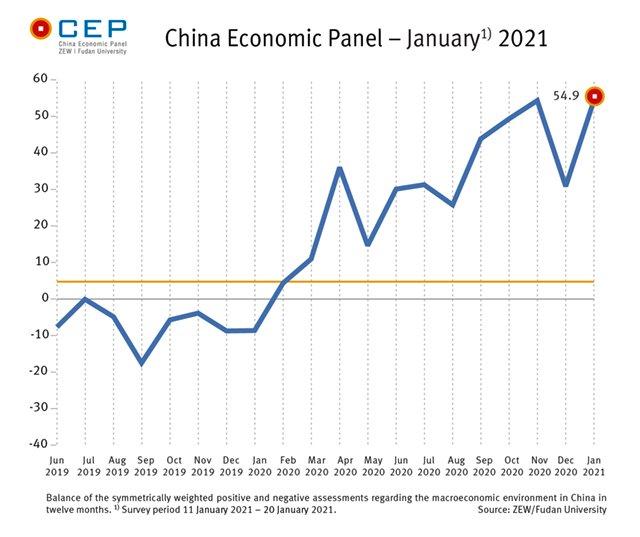The assessment of the current economic situation dropped slightly by 1.6 points to a still very high value of 42.2 points. This positive assessment reflects China’s rather good economic growth performance in 2020 compared to that of the EU or the USA. China’s gross domestic product (GDP) only showed a decline in the first quarter of 2020 before growing again by 6.5 per cent in the fourth quarter of 2020 (compared to the same quarter of the previous year). In 2020 as a whole, the economy grew 2.3 per cent.
In the first quarter of 2021, real GDP growth is expected to increase even further and, according to the forecasts, will reach eight per cent (relative to the previous year). In the course of the year, however, the forecasts show that the dynamic recovery will weaken slightly: real GDP is projected to increase by 5.9 per cent in the second quarter. This is also the expected growth rate for the whole of 2021. The survey participants continue to assume that the Chinese government will promote growth with supportive economic policy measures. Accordingly, they expect a further increase in government and corporate debt.
“The positive outlook for China for the current year is visible in virtually all sectors covered in our survey as well as in all important economic regions of China. Only for Hong Kong and, to a lesser extent, Tianjin are the prospects clearly below average,” says Dr. Michael Schröder, who coordinates the survey in ZEW’s Research Department “International Finance and Financial Management”.
For 2022, however, the experts assume that the long-term downward trend in GDP growth rates will take hold of the Chinese economy again. They expect economic growth of only 4.9 per cent in 2022, which would be rather modest by Chinese standards.
Download the corresponding data sheet and graph.
ZEW in Mannheim conducts research in the field of applied and policy-oriented economics and provides access to important data sets for national and international researchers. The institute provides advice to policymakers, private companies and government institutions at both the national and EU level on how to tackle current economic policy challenges. The central concern of ZEW’s research is to analyse and design markets and institutions that allow for the sustainable and efficient development of knowledge-based economies in Europe. By keeping the public informed on its latest research and providing further training to researchers and business leaders alike, ZEW acts as a guide through economic change. ZEW Mannheim was founded in 1991 and employs a staff of approximately 200, two thirds of whom are researchers. ZEW is a member of the Leibniz Association, a network of outstanding research institutes in Germany.
Research at ZEW
Labour Markets and Human Resources; Digital Economy; Economics of Innovation and Industrial Dynamics; International Finance and Financial Management; Market Desin; Social Policy and Redistribution; Environmental and Resource Economics, Environmental Management; Corporate Taxation and Public Finance.
ZEW – Leibniz-Zentrum für Europäische Wirtschaftsforschung GmbH Mannheim
L 7
68161 Mannheim
Telefon: +49 (621) 1235-01
Telefax: +49 (621) 1235-222
http://www.zew.de
Senior Researcher in the ZEW Research Department "International Finance and Financial Management"
Telefon: +49 (621) 1235-368
E-Mail: michael.schroeder@zew.de
Presse- und Öffentlichkeitsarbeit
Telefon: +49 (621) 1235-133
Fax: +49 (621) 1235-255
E-Mail: sabine.elbert@zew.de
![]()
